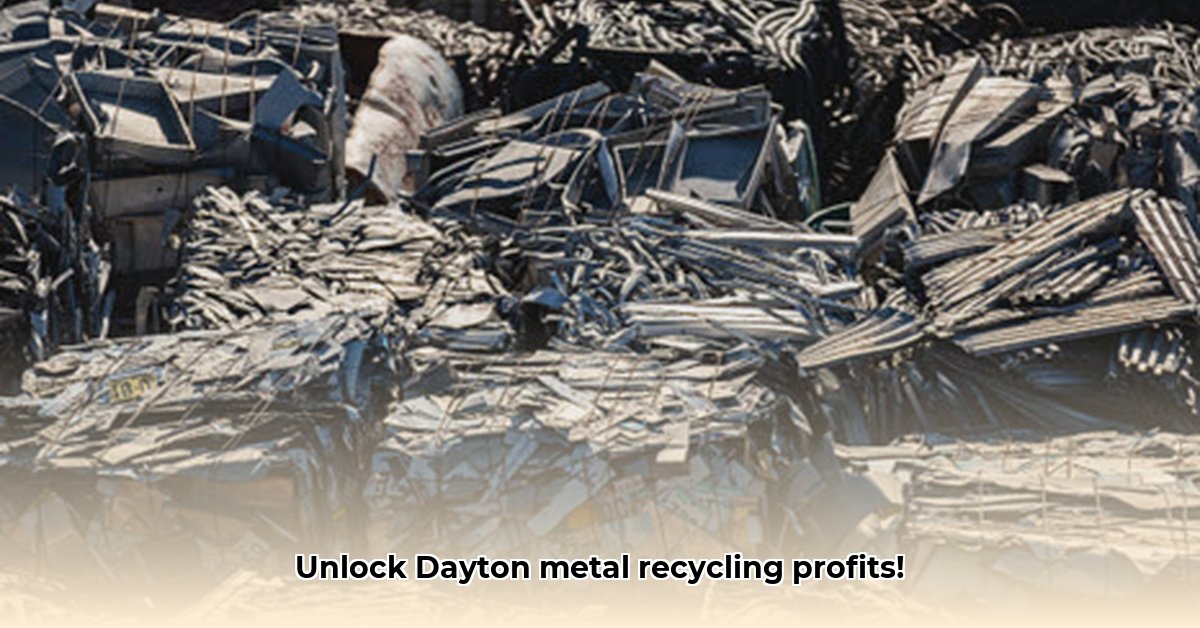
Making a profit in the Dayton scrap metal recycling industry requires a strategic approach. This guide provides actionable steps to enhance your operation, whether you're an established player or just starting out. We'll cover optimizing pricing, improving customer service, leveraging technology, managing market volatility, and ensuring regulatory compliance. We'll also explore strategies for businesses generating scrap metal.
Understanding Dayton's Scrap Metal Market: A Competitive Landscape
Dayton boasts a competitive scrap metal recycling market with established players like Franklin Iron & Metal Corp. This competitive landscape presents both challenges and opportunities. Success hinges on differentiating your business through superior pricing strategies, exceptional customer service, and the adoption of advanced technologies. Analyzing local market dynamics, including competitor pricing and technological advancements, is crucial for developing a successful strategy. How can you distinguish yourself in this crowded market?
Optimizing Pricing Strategies: A Data-Driven Approach
Pricing scrap metal effectively involves a delicate balance. You must consider the type of metal, fluctuating market prices, and competitor pricing. Data-driven strategies are key. Real-time market data, readily available online and through market reports, lets you adjust pricing dynamically to maximize profits.
Step-by-Step Pricing Optimization:
- Daily Market Monitoring: Track local prices daily using online resources and reports (e.g., specialized scrap metal pricing websites).
- Cost Analysis: Thoroughly analyze operational costs (labor, transportation, processing).
- Strategic Pricing: Set competitive prices that guarantee a healthy profit margin.
Supercharging Customer Service: Building Lasting Relationships
Excellent customer service is critical for repeat business and referrals. Efficiency and transparency are paramount. Customers value quick processing, clear pricing without hidden costs, and regular updates on their transactions.
Customer Service Enhancement Steps:
- Streamlined Operations: Optimize processes to minimize wait times. Analyze bottlenecks and improve workflow.
- Crystal-Clear Pricing: Ensure complete transparency in your pricing structure.
- Proactive Communication: Keep customers informed at every stage of the process.
Leveraging Technology: Modernizing Your Operations
Technology is transforming the scrap metal industry. Advanced technologies offer significant advantages, but careful planning is crucial due to substantial upfront investment and the need for specialized expertise.
| Technology | Advantages | Disadvantages |
|---|---|---|
| AI-Powered Sorting Systems | Increased accuracy, reduced labor costs | High initial investment, potential technical issues |
| Robotic Automation | Faster processing, enhanced workplace safety | Substantial initial costs, need for specialized expertise |
| Data Analytics & Predictive Models | Enhanced pricing, improved inventory control, accurate forecasting | Requires skilled data analysts, data security considerations |
Navigating Market Volatility and Supply Chain Risks: Mitigation Strategies
Metal prices are inherently volatile, and supply chain disruptions are a constant threat. Mitigate these risks through diversification and strategic planning.
Risk Management Strategies:
- Multiple Suppliers: Diversify your raw material sources to avoid dependence on single suppliers.
- Long-Term Contracts: Negotiate contracts to secure stable pricing and supply.
- Strong Supplier Relationships: Build strong relationships with reliable suppliers.
Regulatory Compliance: Environmental Responsibility
Environmental regulations are crucial in the scrap metal industry. Non-compliance leads to hefty fines and reputational damage. Proactive compliance demonstrates responsible business practices.
Compliance Best Practices:
- Stay Informed: Continuously update your knowledge of environmental regulations.
- Sustainable Practices: Implement eco-friendly operations.
- Meticulous Documentation: Maintain thorough records of compliance activities.
Actionable Strategies for Metal Consumers/Manufacturers: A Collaborative Approach
For businesses generating scrap metal, strategic sourcing is paramount. Negotiate favorable pricing with recyclers, focusing on long-term partnerships. Efficient scrap metal management directly impacts profitability and environmental sustainability.
Conclusion: A Data-Driven Approach to Success
Success in Dayton's scrap metal recycling industry demands a proactive, data-driven approach. By implementing the strategies outlined above—optimizing pricing, enhancing customer service, leveraging technology, managing risk, and ensuring compliance—your business can thrive in this competitive market. Remember that consistent adaptation to market shifts and technological advancements is vital for long-term success. What proactive steps will you take today to enhance your business?